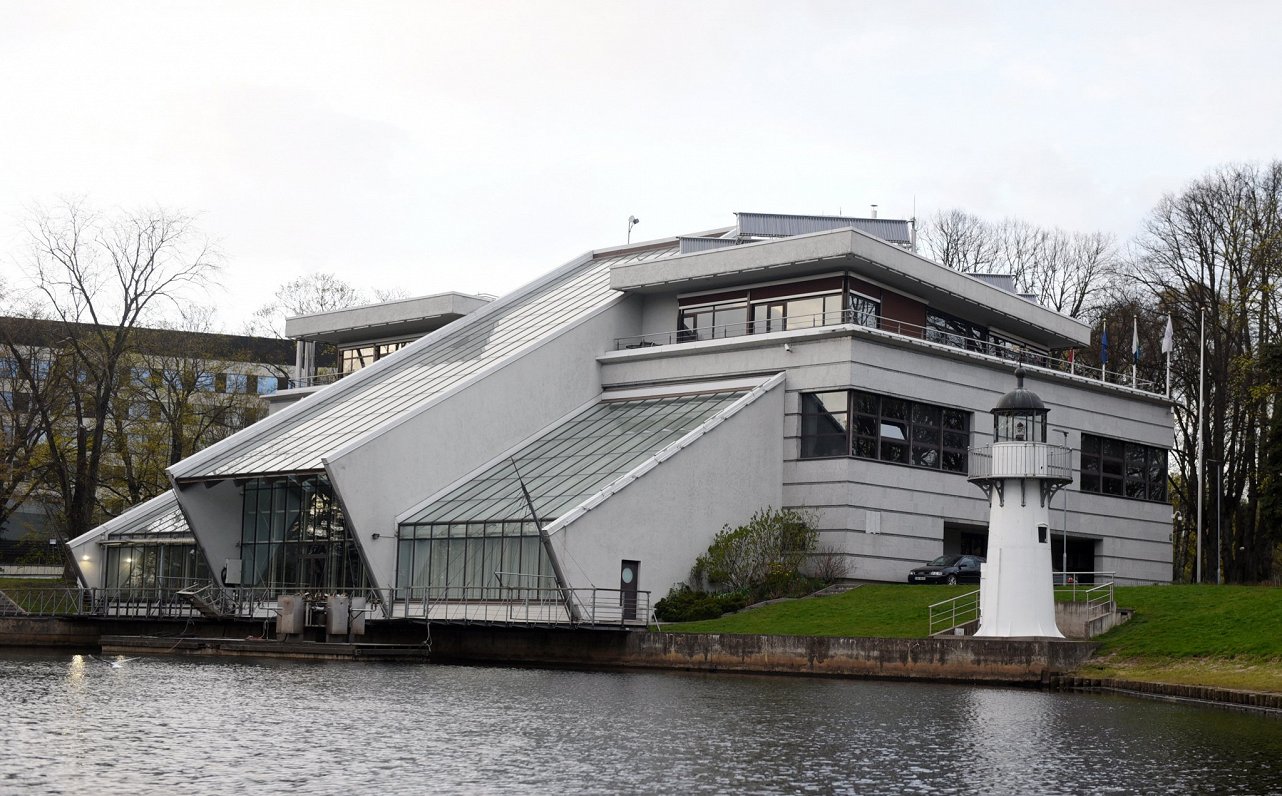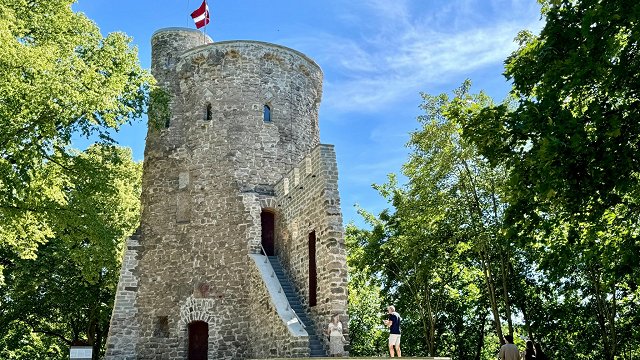The plan had not been publicly announced but is mentioned in the presentation of a real estate company, which came into the possession of Latvian Radio's reporters and the Freeport Authority confirmed it when asked, stating that they made the decision due to the geopolitical situation.
The building, which – according to your view – is either an interesting piece of architecture in an unexpected location or a monstrous carbuncle that is completely at odds with the rest of the park has a cadastral value of more than 2.3 million euros, but the land on which it sits is owned by the municipality, which has the right of first refusal to buy the property, though no agreement has been struck as yet.
Built in the 1970s, the building once housed one of the most renowned restaurants in Riga, but since 2000, after a major reconstruction, the Free Port Authority has been operating there, not without controversy over car parking arrangements for employees.
Now the Freeport Authority has decided to leave the park, it eventually confirmed in response to Latvian Radio's questions
"Currently, it is certainly no secret to anyone what the geopolitical situation is and what is happening to total cargo volumes. It is clear that in the port and logistics industry we are seeing quite serious changes, including a drop in cargo volumes, so we are definitely looking at ways to do things more efficiently," admitted deputy manager Mārtiņš Ziemanis.
He emphasized that the old building needs to be repaired. In addition, there are many vacant spaces in the building that are not suitable for the administration, so the building is planned to be disposed of at auction, with the new owner being chosen based on the highest price offered.
It is not planned to include in the auction rules on the purpose for which the building can be used.
"Obviously, the object is somewhat unique. It's not a standard object. It will definitely be determined by the market, what that interest will be. It will be a public auction open to all, anyone can participate. The market will determine this interest. I think it is a matter of the next few months when we could start this auction. Within half a year, we could certainly realize the sale," said Ziemanis.
It should be noted that the land at 12 Kalpaka Boulevard belongs to the municipality, according to information on the website of the State Land Service. However, the right of first refusal of the Riga City Council to purchase the building first comes with strings attached, points out Ernests Saulītis, head of the municipality's Real Estate Administration.
"I would like to draw your attention to the fact that according to the regulations of the Cabinet of Ministers, that [building] is the territory of the Free Port of Riga. So, what kind of economic activity is allowed there, it must be calculated not only from the point of view of the development plan, but also that it is the territory of the Free Port," explained Saulītis.
When asked if he would use the right of first refusal, he admitted: "It's a difficult question. First of all, it is not known how much this transaction will cost. Secondly, the Law on Ports stipulates that the right of first refusal, given that it is the territory of the port, belongs to the port itself."
The Law on Ports states that the right of first refusal on land and other immovable property in the territory of the Port of Rīga and Ventspils port belongs to the capital company that performs the functions of the port administration. The city council replied in writing that the relevant capital company has not yet been established in the Port of Rīga.
"Its right of first refusal belongs to the municipality, considering that it is a shared property. The right of first refusal for the port remains the same until a capital company has been established, but the port authority will no longer use its right of first refusal to buy its own building. It would be absurd," explained Ziemanis.
"In accordance with the regulations, the municipality should be approached when an agreement has been reached on the transaction and the municipality takes the place of the buyer. Until then, the municipality does not need to be contacted," explained Ziemanis.
New use, new life?
Meanwhile, the Riga Center Development Association NGO urges the municipality to buy the building so that it can then be handed over to a tenant to give it new life. A representative of the organization, Ilmārs Millers, continues.
"It could be a school, a theater, a cafe as used to be there, a center for people with mobility impairments, a rehearsal space for the national orchestra while its concert hall is still being built... There are a lot of possibilities," said Millers.
"The main thing is to eradicate this principle that we simply permanently sell our best places, then look at what is left for society. If Riga wants to be a European city not only on the map and in brochures, then we must make sure that the best places in the center of Riga are not closed, so that they are accessible to the public."
There could be, for example, an exhibition hall or a museum. Having another office building in Kronvalda Park woud be the worst option, emphasized environmental architect Matīss Šteinerts.
"The first building that was built there was in the 1930s, [when] the Piena Pavilion was built, a restaurant in the folk romantic style. At that time it corresponded to the spirit of what good architecture was. It was a public place and always was a public place where you could meet until the 1990s.
There is no other comparable site in Riga right by the canal, but the building needs repairs, besides, these days it counts only as B or second-class office space and the land belongs to the municipality, so it is unlikely that anyone would be willing to pay more than three million euros for it, according to Latvian real estate business associations manager Aigars Šmits.
"This is really not the kind of emotionally stunningly beautiful property that will make someone come and see a little more than 3,000 square meters in the park and say 'I like it so much that I'm going to buy this, invest in its restoration'. I'm sorry, but an investor is someone with money who wants to make more money," Šmits said, adding that the potential costs of recostruction work need to be added to the price.
"Then the next question is - who will be the tenant and what will the rent be after this reconstruction, seeing that new, really energy-efficient office centers with an almost unlimited number of parking spaces are being built near and around Rīga in very good locations – in the Skanstes quarter, Ķīpsala, with good access," he continued.
There is still a lot of uncertainty about the future fate of the building. For the time being, it is also not clear under which roof the Free Port Authority will reside in future. Its office will probably move closer to the port, Ziemanis admitted, adding that this is the only property that Freeport is currently planning to sell.





























